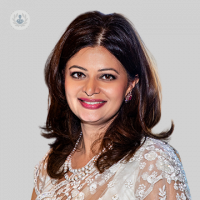A guide to egg freezing at London Fertility Clinic
Written by:The road to pregnancy is not always smooth, and some women, particularly as they grow older can feel the worry and stress of feeling that their biological clock is ticking. Fortunately, egg freezing is a concept which can help to lessen the burden of these worries. We speak to renowned senior fertility specialist, Dr Anu Chawla who discusses everything you need to know about egg freezing and explains how this treatment is carried out at the London Fertility Clinic.

How can my eggs be preserved at the clinic?
At our clinic, we provide a comprehensive egg freezing programme, which provides reassurance for women who wish to preserve their reproductive material. Our specialists work tirelessly to create customised plans, which use state-of-the-art equipment and technologies.
We delicately retrieve your mature eggs and employ cutting-edge vitrification, preserving them at their peak potency through cutting-edge vitrification. This state-of-the-art flash-freezing technique safeguards the integrity of each valuable cell, preserving the potential for future healthy pregnancies.
What are the advantages of egg freezing?
Egg freezing is a wonderful option for women, which has the opportunity to transform their lives. It gives them the freedom to focus on their career, undergo medical treatments that may impact fertility, or simply seek to extend their reproductive horizons. It gives women the freedom to pursue goals without compromise, and our team, equipped with world-class facilities, are able to help you every step of the way.
What methods are used to freeze eggs?
In recent years, the field of reproductive medicine has advanced greatly, and has reshaped the landscape of fertility preservation for young single women. Led by innovations in oocyte cryopreservation methods, researchers have uncovered numerous benefits in egg freezing, profoundly influencing the reproductive autonomy of individuals in this demographic.
One pivotal development stems from refinements in vitrification, a flash-freezing method that minimises cellular damage during the cryopreservation process. This method has significantly enhanced the post-thaw survival rates of oocytes. Research findings have shown that vitrified eggs now achieve survival, fertilisation, and embryo development rates comparable to those of fresh oocytes, offering robust evidence of its effectiveness as a fertility preservation approach.
Does age impact egg freezing methods?
Yes, investigations have clarified the impact of age on the success of egg freezing. Research by various experts in reproductive medicine demonstrates that harvesting and freezing eggs at a younger age, typically in the mid-20s to early 30s, yields oocytes of superior quality and higher developmental potential. This crucial finding affirms that early intervention in the form of egg freezing empowers young women to leverage their peak reproductive years, transcending the constraints of age-related decline in fertility. In combination with technological advancements, the integration of personalised medicine approaches has emerged as a key area of focus.
Researchers, building on the pioneering work of figures such as Dr Anna Kobo and her contemporaries, are exploring tailored protocols for ovarian stimulation to optimise egg yield while mitigating risks associated with hyperstimulation. Through individualised treatment regimens, researchers aim to optimize oocyte quality and quantity, bolstering the efficacy of egg freezing procedures. The past five years have also witnessed a burgeoning interest in the assessment of pre-freeze oocyte quality.
What are the latest developments in egg freezing technologies?
Building upon the groundbreaking contributions of figures such as Dr Anna Kobo and her peers, researchers are investigating customised ovarian stimulation protocols to enhance egg production while reducing the risks associated with hyperstimulation. By tailoring treatment plans to individual needs, researchers seek to enhance both the quality and quantity of oocytes, thereby improving the effectiveness of egg freezing procedures. Over the last five years, there has been a growing interest in evaluating the quality of oocytes before freezing.
Advanced imaging techniques and molecular analyses, including spindle and mitochondrial assessments, have enabled clinicians to identify oocytes with the highest likelihood of successful thawing and subsequent fertilization. These cutting-edge methodologies, inspired by the collective efforts of researchers such as Dr Anna Kobo and her peers, empower young single women to make informed decisions about the timing of their fertility preservation endeavours.
Furthermore, recent studies have brought attention to the various clinical contexts where frozen oocytes can be applied. Beyond elective fertility preservation, vitrified eggs are increasingly utilised in cases of medical necessity, such as prior to chemotherapy or radiation treatments that may compromise future fertility. This broadening range of applications for egg freezing underscores its versatility as a proactive measure to protect reproductive choices in the presence of unexpected health-related difficulties.
The past five years have witnessed a remarkable evolution in egg freezing techniques and their application in the realm of reproductive medicine. This dynamic convergence of technological prowess and personalised care empowers women to take control of their reproductive futures, transcending the limitations imposed by time and circumstance.
If you are considering egg freezing and would like to book a consultation with Dr Chawla, do not hesitate to do so by visiting her Top Doctors profile today.


